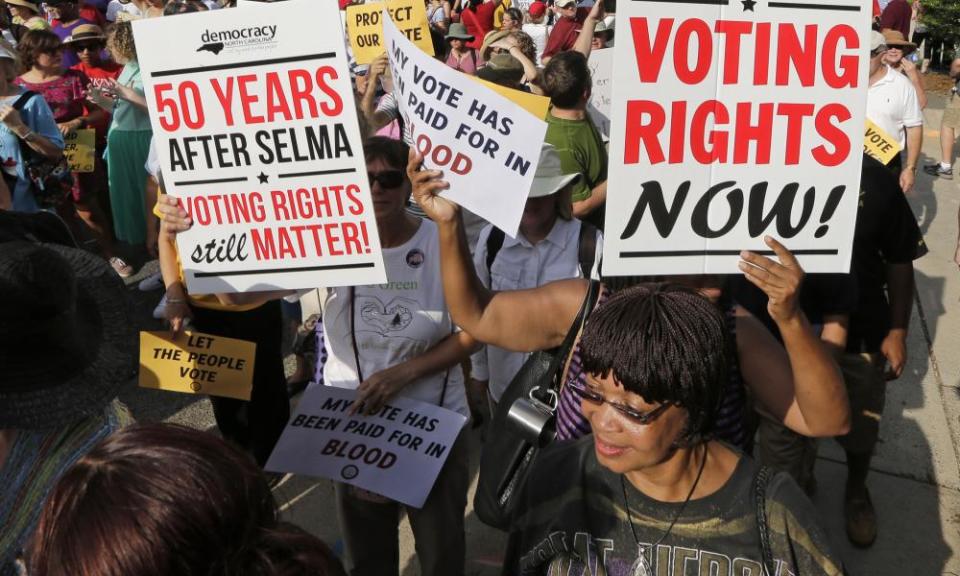The Chief review: John Roberts and the decline of American democracy

If you believe, as I do, that the decline of the United States began with the election of Ronald Reagan in 1980, which brought a new determination to make the rich richer and America whiter through huge tax cuts for the wealthy and the re-segregation of education, and if you agree that those noxious leitmotifs are still doing profound damage to our republic, it is not difficult to argue that John Roberts has done as much as any other member of his generation to hasten the decline of American democracy.
Related: If We Can Keep It review: how Trump happened and how America might survive
The pages of Joan Biskupic’s new, carefully reported biography of the chief justice are replete with evidence to support that conclusion – which Biskupic is much too polite to reach.
Biskupic is a former Washington Post supreme court correspondent who is now a legal analyst for CNN. Like most members of the small fraternity of full-time supreme court reporters, she shows deference to Roberts’ brilliance that undercuts any capacity to be brutal about the consequences of his decisions – or the myriad legal opinions he wrote for Republican administrations before he became a judge.
The author has known Roberts for more than 20 years and he granted her 20 hours of interviews. She has rewarded that courtesy with plenty of anodyne observations. Roberts, we are told, “has an uncanny ability to size up a situation and calibrate his responses”, while “the notion that John plays his cards close to his chest is a dramatic understatement”. “He moves,” Biskupic writes, “with tight discipline, arms close to his sides, shoulders squared.” Most banal of all, where Roberts goes next “will likely be determined by where he has been”.
Biskupic makes it clear this son of an Indiana steel executive has always been a rigid rightwing ideologue
Biskupic also makes it clear this son of an Indiana steel executive has always been a rigid rightwing ideologue, relentlessly hardworking and ambitious. At the end of his third year at Harvard law school, he checked himself into hospital with “exhaustion” – but managed to graduate a few weeks later, magna cum laude. He clerked for the supreme court justice William Rehnquist, who reinforced his youthful ideology. In 1980, Roberts “was captivated by Ronald Reagan’s presidential campaign”. When he listened to the former California governor’s inaugural address, he “felt he was speaking directly to me”.
At 26, Roberts became a special assistant to attorney general William French Smith, which gave him a “key connection to the legal network in Washington”. He immediately staked out his loathsome opinions on many of the most important social issues of our time. Biskupic writes: “A straight line can be drawn from his positions on voting rights, affirmative action, religion and abortion rights in the 1980s to his expressed views” on the supreme court after his appointment in 2005.
As part of his youthful opposition to the renewal of key portions of the Voting Rights Act of 1965, Roberts pretended there was “no evidence of voting abuses nationwide”. Biskupic does correct that notion: “Race discrimination in voting was still widely documented, particularly in southern states such as Alabama.” But Roberts never changed his mind about that or almost anything else.
When the landmark case of Shelby County v Holder reached the supreme court in 2013, Roberts delivered the majority opinion that gutted legislation which had done so much to ensure the suffrage rights of African Americans routinely banned from southern polling places since the end of the civil war.
That decision came three years after Roberts lobbed his single largest grenade at the heart of American democracy, when he joined the other conservative justices to give corporations the right to spend as much money as they chose to elect the public officials who would be most enthusiastic about promoting unfettered capitalism. The majority in Citizens United decided that any limit on independent campaign spending by corporations was a violation of the first amendment. Since then, almost all of the tensions between democracy and capitalism have been resolved in favor of the latter.

Demonstrators for voting rights march through Winston-Salem, North Carolina in 2015.Photograph: Chuck Burton/AP
The complete absence of any visible personal life during Roberts’ first four decades is the biggest mystery Biskupic does not manage to penetrate. When he was 40, Roberts was still single. The Los Angeles Daily Journal reported his office contained “no family photos, mementos or items that reflect his personality”. Not long after that, he married Jane Sullivan, who may have been the first woman he dated. They adopted two children.
Related: All the president's men and women: how disobedient aides saved Trump
Roberts strayed from the right in 2012, when he shocked the nation by joining his four liberal colleagues to uphold Barack Obama’s Affordable Care Act. This single act of sanity has sparked some hope that Roberts might replace Anthony Kennedy as the most reliable swing vote. But except in 2015, when he backed the ACA again, he has remained reliably rightwing.
Biskupic refuses to make predictions, writing that Roberts “may find his way, as he did in 2012, to something resembling a middle ground”, or that he “might choose to retreat to the patterns seen in 2018, when he appeared resistant to compromise”. Her final sentences are just as unsatisfying: “The chief justice is leading a court increasingly in his own image. He is positioned at the center in every way, and the law will be what he says it is.”
This leaves little hope that Roberts could emerge as a key figure in a national effort to reverse the worst excesses of the Trump administration, particularly if the White House holds firms to its announced intention to resist all subpoenas from a Democratic House of Representatives, and the supreme court becomes the final arbiter in this emerging constitutional crisis.

 Yahoo News
Yahoo News 
